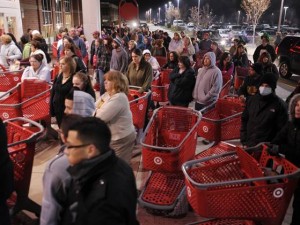Black Friday is receding into Thanksgiving. A U.S. News articlereports that Wal-Mart, Sears and

Toys-R-Us will have flung wide their gates at 8 pm on Thursday. Target is exercising remarkable restraint, waiting an hour later to begin the madness.
I’ve been reflecting on this phenomenon in the context of reading William Cavanaugh’s Being Consumed, where
he suggests:
What really characterizes consumer culture is not attachment to things but detachment. People do not hoard money; they spend it. People do not cling to things; they discard them and buy other things (34).
We have a transient relationship with the things we buy. They quickly are updated by next year’s model, or are made cheaply enough that they simply don’t last long.
Cavanaugh explains:
…rather than hoarding treasured objects, consumers are characterized by a constant disatisfaction with material goods. This disastisfaction is what produces the restless pursuit of satisfaction in the form of something new. Consumerism is not so much about having more as it is about having something else; that’s why it is not simply buying but shopping that is the heart of consumerism.(35)
There’s an inevitability to this, so shouldn’t get too down on ourselves. You and I are consumers–restlessly on the move for the new and the next. And we are all integral players in a larger economy–a culture, even–over which we have no direct control. But what Cavanaugh is suggesting is that we need to think harder–and more theologically–about this system in which we find ourselves. A guilt trip just misses the larger point. And there is something healthy (and Christian) about being detached from our possessions. They aren’t supposed to define us or consume us. The problem is the way in which we experience that detachment. It’s healthy to be detached from possessions and consumption if that detachment is because we are more securely attached to something greater and more enduring–like God and our fellow human beings.
 So we should approach our possessions as items to be used, rather than as ends in themselves. All creation is good–including products created by other human beings. But they ought not usurp the place of God in our daily lives. Channeling Augustine, Cavanaugh notes that created goods can be used, but only God should be enjoyed. That might be too strong a way to put it (a lot of things can be enjoyed, without detriment), but the important point is that our restlessness cannot be solved by being consumers–or shoppers–but by resting in God and finding God to be the ultimate source of joy and object of desire.
So we should approach our possessions as items to be used, rather than as ends in themselves. All creation is good–including products created by other human beings. But they ought not usurp the place of God in our daily lives. Channeling Augustine, Cavanaugh notes that created goods can be used, but only God should be enjoyed. That might be too strong a way to put it (a lot of things can be enjoyed, without detriment), but the important point is that our restlessness cannot be solved by being consumers–or shoppers–but by resting in God and finding God to be the ultimate source of joy and object of desire.
This leads Cavanaugh to the most interesting point of the book. The Christian practice of Eucharist, thanksgiving, enables us to switch roles. In the celebration of Eucharist, we are no longer consumers; rather, we are being consumed. We are taken up into the universal body of Christ, as we partake in the meal.
So Black Friday is fundamentally transformed–and eternally relativized–by Good Friday. The death of Jesus on the cross ends the spiral into nihilism that would be in place if the only thing that mattered was material consumption–if the only thing that counted was the next, best deal.
The point of this post is not to rain down guilt or spoil a good time. I’m as given to consumerism as the next American. I just don’t like long lines.
But Cavanaugh’s book has challenged me to think in a fresh and challenging way about the connection between Black Friday, Good Friday, and the Eucharist.












